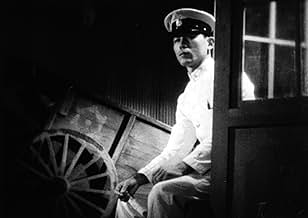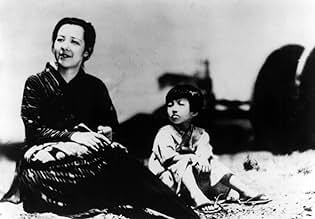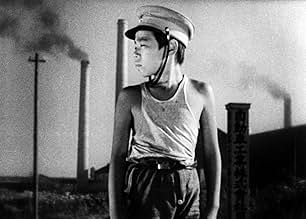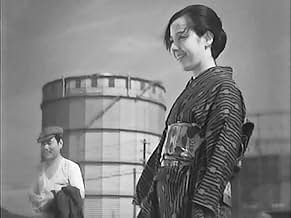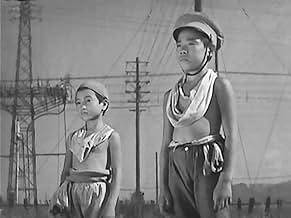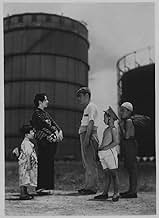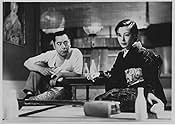IMDb RATING
7.4/10
1.8K
YOUR RATING
Unemployed Kihachi and his two sons struggle to make ends meet. But that doesn't keep Kihachi from wooing single mother Otaka.Unemployed Kihachi and his two sons struggle to make ends meet. But that doesn't keep Kihachi from wooing single mother Otaka.Unemployed Kihachi and his two sons struggle to make ends meet. But that doesn't keep Kihachi from wooing single mother Otaka.
- Director
- Writers
- Stars
- Director
- Writers
- All cast & crew
- Production, box office & more at IMDbPro
Featured reviews
An Inn in Tokyo follows Kihachi, a nearly penniless, wandering laborer, as he and his two young sons, Zenko and Shoko, search through the industrial wastelands of Tokyo, hoping for any work to sustain them. For three days, their efforts are fruitless, leaving them weary and hungry. Along the way, they meet Otaka, a widowed mother with her own little girl, Kimiko. Similarly struggling, the two families form a bond, united by their hardship and loneliness in this desolate landscape.
Eventually, Kihachi encounters an old friend, Otsune, who runs a small café. She offers Kihachi a job, and for the first time in days, he finds a brief sense of relief and joy. However, Kihachi soon learns that Kimiko has fallen seriously ill with dysentery, leaving her mother unable to pay the hospital fees. Desperate to help, Kihachi attempts to borrow from Otsune, but when she cannot lend the money, he makes the painful choice to steal from a wealthy bar. He gives the stolen money to Otaka for her daughter's care, sacrificing his own freedom in the process.
In a poignant final act, Kihachi asks Otsune to care for his sons, then walks alone to the police station to surrender. His oldest son, aware of the sorrow weighing on his father, serves him an imaginary cup of sake, a brief and tender gesture of understanding that underlines the deep connection between them.
This was Ozu's penultimate silent film, and it serves as a precursor to Italian neorealism, blending stunning technical precision with a powerful exploration of human resilience. Set against the bleak, industrial sprawl of Tokyo, Ozu presents the heartbreaking plight of two lost adults and their children, highlighting social hardship while masterfully capturing fleeting moments of humor and humanity. The film's compassionate performances, especially by the children, enrich this landscape, imbuing it with life and depth.
Eventually, Kihachi encounters an old friend, Otsune, who runs a small café. She offers Kihachi a job, and for the first time in days, he finds a brief sense of relief and joy. However, Kihachi soon learns that Kimiko has fallen seriously ill with dysentery, leaving her mother unable to pay the hospital fees. Desperate to help, Kihachi attempts to borrow from Otsune, but when she cannot lend the money, he makes the painful choice to steal from a wealthy bar. He gives the stolen money to Otaka for her daughter's care, sacrificing his own freedom in the process.
In a poignant final act, Kihachi asks Otsune to care for his sons, then walks alone to the police station to surrender. His oldest son, aware of the sorrow weighing on his father, serves him an imaginary cup of sake, a brief and tender gesture of understanding that underlines the deep connection between them.
This was Ozu's penultimate silent film, and it serves as a precursor to Italian neorealism, blending stunning technical precision with a powerful exploration of human resilience. Set against the bleak, industrial sprawl of Tokyo, Ozu presents the heartbreaking plight of two lost adults and their children, highlighting social hardship while masterfully capturing fleeting moments of humor and humanity. The film's compassionate performances, especially by the children, enrich this landscape, imbuing it with life and depth.
10mgmax
The richly moving story of a hard-luck father and his two children, this masterpiece of unadorned realism may remind you more of Italian films like Shoeshine than Ozu's more staid work of the 50s. (The inspiration was probably Vidor's The Crowd, and a comparison with that masterpiece is by no means out of order.)
This early great work from The Master is a sobering melodrama honed squarely on a single unemployed, homeless father struggling to feed and shelter his two sons. Ozu does a fine job capturing the dynamic between the two boys by themselves and with their father, but the film really gets interesting when two women enter the story: a young single mother, also homeless, and an old friend who finds the father a job. The maudlin climax seems to anticipate Ford's GRAPES OF WRATH and DeSican melodrama -- though in the wrong ways -- but prior to that Ozu comes up with an quirky expressionist sequence to reflect the father's unraveling moral state.
This is a silent film by Ozu, and it is brilliant both in its simple telling of the story and its development of the characters. This film is about a father, Kihachi, who has two small sons and is looking for work, so they can eat. He meets a young mother with a daughter and for a while she is out of the film. Near the end of his rope, he runs into an old female friend, who finds work for him and enables the boys to go to school. The young mother has come to the town with her daughter and he looks to help her, but is also interested in her. As simple as this sounds, the film is wrought with emotion, and is brilliant in that your own thoughts could be somewhat mixed about this. Shouldn't he be more grateful to the (female) friend who helped him find work? One of Ozu's best qualities is to show sadness, happiness and fear in its most basic, raw forms. The acting, even by the children, is uniformly wonderful. Even Mr. Ryu, whom I believe to be one of the greatest if not the greatest character actors in film history, is in this film in a small role. Ozu's films are methodically slow moving mostly, this one included, but I have always felt that prospective film makers should study his work to understand the virtues of simplicity in telling a story on film. Up there with Ozu's best. Possibly not as good as "Tokyo Story" and "Late Spring" but very highly recommended.
A classic exercise for one with writers block is to pick a location, then build a story around it. I haven't read anything to suggest Ozu was suffering from writers block at the time, but that is the way much of 'An Inn in Tokyo' plays out, with a good two thirds of the story occurring in the empty fields outside factories. The fields are bare bar for unkempt shin high grass, and old bits of machinery, mostly performing the role of seats, strewn about, with towers and cranes and billowing smoke always looming in the background - a symbol of dirty prosperity amongst the otherwise barren landscape. And who does Ozu put in these fields? Why a father and two sons of course, which will come as no surprise to anyone familiar with his other silent work - it seems to be his special subject. The story plays out like a groundhog day - the man and his sons have no money, and wander the fields from factory to factory looking for work, filling their time between rejections by sitting in the fields and having the same conversations as the previous day - different variations of, 'Are you hungry?" What little money they do have, his sons blow on buying a nice hat they saw another boy with, before losing their fathers rucksack. It all looks nigh on hopeless before a chance encounter with a past friend at an inn in Tokyo finds him some work, and offers a floor to sleep on. They befriend a fellow jobless woman and her daughter, unselfishly sharing food with them, before the story takes a dramatic and heartbreaking (albeit not unpredictable) turn when the daughter gets sick, and the question of all adults are begged - what are you prepared to do for the sake of your children, and what is the cost?
It is a typically humble, family driven film from Ozu, where all characters are flawed, yet viewed with a sympathetic eye for the difficulties they face. Such is the down to Earth quality of the film (even Ozu's camera placements are 'down to Earth') that 'entertainment' hardly feels like an apt description, which is both a gift and a disservice. A gift in that it doesn't feel too showy or trivial, and a disservice in that it is a touch lackluster. Ozu's best silent work ('I Was Born But', 'Passing Fancy') contain similar themes in the same style, yet manage to entertain thanks to humour and charm. Those moments are not totally absent here, just more subdued. While the low key repetitiveness of the first act will threaten to turn some viewers away, it ultimately gives the drama of the final act greater impact, and the film is better for it. It is definitely one for those who like their films depressing, but makes a fine entry in the genre, and is preferable to Ozu's earlier, melodramatic silent 'A Story of Floating Weeds'. 6.5/10
It is a typically humble, family driven film from Ozu, where all characters are flawed, yet viewed with a sympathetic eye for the difficulties they face. Such is the down to Earth quality of the film (even Ozu's camera placements are 'down to Earth') that 'entertainment' hardly feels like an apt description, which is both a gift and a disservice. A gift in that it doesn't feel too showy or trivial, and a disservice in that it is a touch lackluster. Ozu's best silent work ('I Was Born But', 'Passing Fancy') contain similar themes in the same style, yet manage to entertain thanks to humour and charm. Those moments are not totally absent here, just more subdued. While the low key repetitiveness of the first act will threaten to turn some viewers away, it ultimately gives the drama of the final act greater impact, and the film is better for it. It is definitely one for those who like their films depressing, but makes a fine entry in the genre, and is preferable to Ozu's earlier, melodramatic silent 'A Story of Floating Weeds'. 6.5/10
Did you know
- TriviaThe credits indicate that the script was based on an original work by a foreign writer with a name that sounds like "Winzart Monet", but it is actually a gag name, derived from "without money".
- ConnectionsFeatured in A Story of Children and Film (2013)
Details
- Release date
- Country of origin
- Language
- Also known as
- An Inn in Tokyo
- Production company
- See more company credits at IMDbPro
- Runtime
- 1h 19m(79 min)
- Color
- Sound mix
- Aspect ratio
- 1.37 : 1
Contribute to this page
Suggest an edit or add missing content

